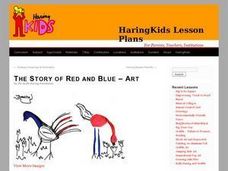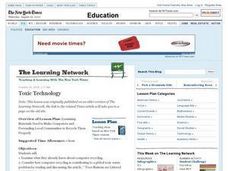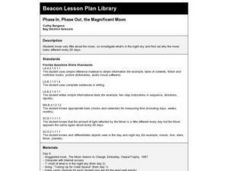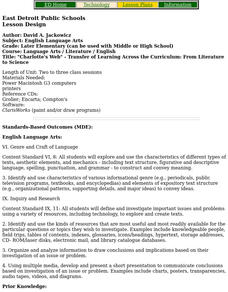Curated OER
The Story of Red and Blue: Art
Students identify art history by examining a list of images on-line. In this painting lesson, students identify the work of Keith Haring by researching the Internet and discuss his style of artwork. Students utilize computers, paint...
Curated OER
TOXIC TECHNOLOGY
Students examine what they already know about computer recycling and cconsider how computer recycling is contributing to a global toxic waste problem by reading and discussing the article, ""Poor Nations are Littered With Old PC's,...
Curated OER
Combining Clouds and Art in the Classroom
Students observe landscape paintings consisting of cloud formations. In this identifying cloud types lesson, students discover different cloud types and characteristics by looking at paintings. Students paint their own pictures at the...
Art Institute of Chicago
Color Combinations
Explore color through an examination of pointillism and light. Class members view Georges Seraut's famous painting on a computer, zooming in and out to see the details and effects of the technique. They then cover how light and color are...
Curated OER
Combining Clouds and Art in the Classroom
Get your head in the clouds before teaching cloud types to your mini-meteorologists. The lesson opens with a beautiful PowerPoint presentation of clouds portrayed in different artists' paintings. After viewing artistic renditions,...
Curated OER
Life Cycle of the Butterfly
Students observe and analyze the life cycle and metamorphosis of the Painted Lady Butterfly. They write observation journal entries three times a week and summarize what they observed. Using KidPix computer software they create pictures...
Curated OER
Paint By The Numbers
Pupils, in groups, explore how astronomical spacecraft and computers create images of objects in space.
Curated OER
Science and Art Museum
Imagine each one of your learners on task and interested in scientific material. Learners investigate science related art by creating a small museum! Using digital cameras, pupils photograph different scientific actions that look...
Curated OER
Butterfly Life Cycle
Third graders investigate the life cycle and development of butterflies. They complete an online WebQuest, and write journal entries about their research information. Students create a poster, and observe real Painted Lady larvae...
Curated OER
Minerals
Students define the characteristics of a mineral. In this geology lesson, students are given out various materials to observe such as a chicken bone, salt shaker, white paint, and chalk. Students categorize the items and are told what...
Curated OER
Animal Slideshow
Second graders view animal fact sheets, and make a slide about an animal. In this animal classification lesson, 2nd graders list facts that help classify the animal. Students use Microsoft paint and color their animal. Students use...
Curated OER
Magical Metamorphosis
Students explore the life cycle of the butterfly and the process of metamorphosis through the creation of painted life cycle habitat. They place each part of the cycle in the correct location through the use of a visual diagram.
Curated OER
Images of the Parks
Students explore U.S. geography by completing a research project about the National Parks. In this scenery image analysis lesson plan, students identify the different national parks in our country and observe paintings and images by...
Curated OER
What is It? Susie Sees!
Students explore the five senses. In this cross curriculum five senses lesson, students view an "I Can See Colors" PowerPoint presentation and sort items by color and shape. Students mix primary color paints to create secondary...
Curated OER
Habitat Art: Florida Panthers
Students discover the lifestyles of a Florida Panther by investigating its habitat. In this wild animal lesson, students utilize the Internet to research the habits of a Panther and what their habitat is. Students create an...
Curated OER
Communication-Do You Hear What I See?
Pupils role play as flight controllers and astronauts, and attempt to replicate drawings using a draw/paint software program such as Microsoft Paint. Through this experiment, students study how hard it is to communicate clearly with people.
Curated OER
Exploring Plants
Pupils examine plants using adiotapes, Internet research, and print media. They name the plant parts and discover their functions. Students create computer-generated pictures of their plants and label the parts. Other activities include...
Curated OER
Photomosaic Pixel Composite
Students select an animal to research. After completing the research they illustrate and paint their animal in the style of a Japanese scroll. Their illustrations are scanned into the computer and imported to PowerPoint. Students...
Curated OER
Side by Side: Butterfly Wings and Symmetry
Students observe butterfly images and then draw and paint their own design. They use this activity to explain symmetry.
Curated OER
Beyond The Earth Part I
Students explore the solar system. In this space science lesson plan, students take notes on the solar system provided by their instructors. Students then collaborate to design a computer-generated drawing of the solar system.
Curated OER
Phase In, Phase Out, the Magnificent Moon
First graders discuss why the moon appears to change shape. They use flashlights and balls to simulate the sun's light shining on the moon during its different phases. They read books, paint pictures and write sentences about the moon.
Curated OER
Life Cycles
Using computers, Students work in small groups and progress through the roles of Explorer, Researcher, Designer, and Evaluator as they study the life cycle of plants, insects, butterflies and frogs.
Curated OER
Photomosaic Pixel Composite
Students research the habitat, diet, life cycle, and characteristics of an animal, and create a Japanese scroll painting of their animal. Using scanned images of animals they have painted, they create a composite mosaic using PowerPoint.
Curated OER
"Charlotte's Web" - Transfer of Learning Across the Curriculum: From Literature to Science
Students research and write about the parts of a spider's body using educational software. They draw spiders using computer software.























